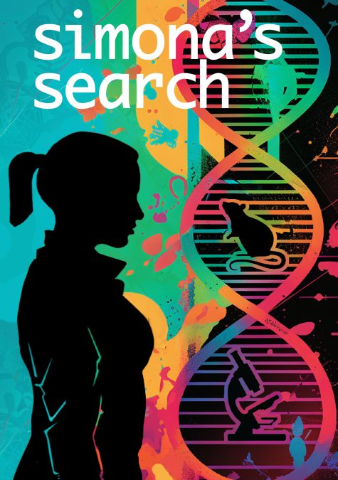Simona’s Search at Hartford Stage
World Preimere Needs Work
By: Karen Isaacs - Feb 07, 2024
Can the effects of severe trauma be passed on to children who were not born at the time and knew nothing about the trauma?
That is the fascinating question at the heart of the world premiere of Simona’s Search now at Hartford Stage through Sunday, Feb. 11.
At the play’s beginning, Simona is a bright, inquisitive preteen who lives with her father, Papi. He is obviously a good father, taking her to museums and exhibitions regularly; he has a deep interest in physics and the bigger questions about the universe. We don’t know what happened to Simona’s mother; she is never mentioned.
Simona wants to host a sleepover – she’s been to many – but Papi is reluctant. The apartment is small, and one can conclude that they are not as affluent as her friends. But he finally agrees. The night of the sleepover, something disturbing happens.
Papi’s past is mysterious. He comes from a Spanish-speaking country but wants Simona to study French. He never talks about his homeland; in fact, the country’s name is never mentioned. He is also closed off, limps, and practically never touches her.
After this event, Simona’s curiosity is tweaked. She begins reading about the effects of trauma on people and concludes that Papi had been tortured. Is that correct? We never know. We do know that Papi has never spoken about what led him to emigrate or why his left leg moves oddly.
As Simona learns more and more, she develops nightmares of a masked figure whom she believes is her father’s torturer.
When she is a graduate student, she wants to explore if the children of parents who endured severe traumatic experiences will develop symptoms of trauma themselves, even if they were not aware of the parent’s situation.
A fascinating question. If so, how is this transmitted? We know that many Holocaust survivors never spoke of their experiences to their children.
Or has Simona jumped to too many conclusions about her father’s past?
This 90-minute play certainly holds your attention. We see Simona from preteen/early teen to late 20s; we see her fall in love but be unable to give in to passion because this mysterious figure appears. We meet her male thesis advisor and the male psychiatrist he recommends to her, both of whom refuse to consider her theory. They view her as unstable, hallucinating, or possibly schizophrenic.
One must ask, though, whether something else is going on: has she experienced a trauma that she has suppressed? Or perhaps it is a hallucination.
The play is a series of short scenes that are set up by Simona as she connects the episodes in the play. Yet at the hands of playwright Martin Zimmerman and director Melia Bensussen, it sometimes avoids the trap of “telling us what happens;” still, the play is too static in many ways.
The program discusses the findings of neuroscientists who have called this phenomenon “transgenerational trauma.”
The playwright, who never resolves any of the plots, seems to believe that this trauma is transmitted physically or psychologically. Yet there is one other possibility that is not considered: is it the silence and the atmosphere of either fear or guilt in the household that causes the children to manifest symptoms of anxiety or depression or more?
The cast is excellent. Alejandra Escalante brings Simona to life; she is assured and sure of her conclusions. Al Rodrigo plays Papi as well as several other characters, including the thesis director and the psychiatrist. He does it so well that you sometimes think it is a different actor. As Papi, he embodies the emotionally shut-off man. Christopher Bannow also plays several roles, but the main one is Jake, Simona’s boyfriend.
The projections by Yana Biryokova lend a surreal touch to the play. The masked figure gets bigger and bigger, making it truly seem like a nightmare.
Simona’s Search is worth seeing, even if you finally conclude that it needs improvement. Less monologue would help, as would having someone point out that Simona’s conclusions may be wrong. The only person who does that, her thesis director, is so blatantly sexist and demeaning that the audience immediately discounts that position.
For tickets, visit HartfordStage.org.

